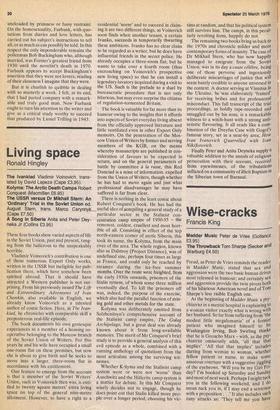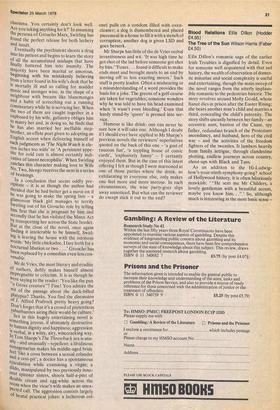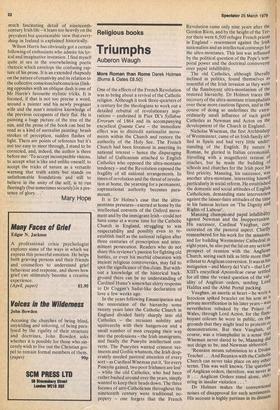Wise-cracks
Francis King
Madder Music Peter de Vries (Gollancz £3.95) The Throwback Tom Sharpe (Secker and Warburg £4.50) Freud, as Peter de Vries reminds the reader in Madder Music, stated that sex and aggression were the two basic human drives most released in humour; and certainly sex and aggression provide the twin pivots both of his hilarious American novel and of Torn Sharpe's less risible English one.
At the beginning of Madder Music a Or chiatrist in a mental hospital is explaining to a woman visitor exactly what is wrong with her husband. So far from suffering from 'the modest little megalomania' of a former patient who imagined himself to be Washington Irving, Bob Swirling thinks that he is Groucho Marx — With, as the psychiatrist ominously adds, 'all that the implies'. 'All that that implies' includes darting from woman to woman, whether fellow patient or nurse, to make some amorous overture with a suggestive jiggling of the eyebrows. 'Will you be my Girl Friday? I'm booked up Saturday and Sunday and most of next week. Perhaps I might tuck you in the following weekend, and I do mean tuck you in, if I may end a sentence with a proposition . .' It also includes such zany attacks as: 'They tell me you have
charisma. You certainly don't look well. Are you taking anything for it?' In assuming the persona of Groucho Marx, Swirling has found the perfect release for both lechery and insult.
Eventually the psychiatrist shoots a drug into his patient and begins to learn the story of all the accumulated mishaps that have finally battered him into insanity. The majority have been marital or amorous, beginning with his mistakenly believing from a letter found in his wife's desk that he ls mortally ill and so calling for madder music and stronger wine, in the shape of a neighbour with breasts like blancmanges and a habit of screeching out a running commentary while he is servicing her. When the two of them are caught together in a cupboard by his wife, gallantry obliges him to marry her and, in doing so, he finds that he has also married her ineffable stepbrother, an effete poet given to adopting an
English accent when delivering himself of such judgments as The Night Watch is eleven inches too wide' or 'A persistent appetite for cold cuts is almost certainly indicative of latent necrophilia'. When Swirling catches this character making love to Wife No. Two, his ego receives the next in a series of bruisings.
In a conclusion that seems oddly precipitate — it is as though the author had decided that he had better get a move on if he was going to make the spring lists — a glamorous black girl manages to terrify Swirling out of his Groucho role by telling him first that she is pregnant by him and secondly that he has violated the Mann Act by transporting her across the State border. Elut at the close of the novel, once again finding it intolerable to be himself, Swirl ing is leaving the house with the ominous words: 'My little chickadee, I fare forth for a
nocturnal libation or two. . . 'Groucho has been replaced by a comedian even less convenable.
Mr de Vries, the most literary and erudite of authors, deftly makes himself almost impregnable to criticism. It is as though he Were saying to the reader: 'You like the pun `a Grosz creature"? Fine! You admire the Wit of the passage about the duck-billed Platypus? Thanks. You find the discussion of J. Alfred Prufrock pretty heavy going? Don't forget that it's a crowd of pretentious Suburbanites airing their would-be culture.' Sex in this hugely entertaining novel is something joyous, if ultimately destructive O human dignity and happiness; aggression is verbal, in a witty, airy, wisecracking way. In Tom Sharpe's The Throwback sex is usually — and unusually — repellent: a libidinous nonagenarian makes his middle-aged bride eel `like a cross between a sexual colander and a cess-pit'; a doctor has a spontaneous ejaculation while examining a virgin; a dildo, manipulated by two previously innocent spinster sisters, shoots half-a-pint of double cream and egg-white across the room when the vicar's wife makes an unexPected call. The aggression consists largely of brutal practical jokes: a lecherous col
onel pulls on a condom filled with ovencleaner; a dog is dismembered and placed piecemeal in a house to fill it with a stench of corruption; another dog is given LSD and goes berserk.
Mr Sharpe has little of the de Vries verbal inventiveness and wit. 'It was high time he got shot of the lad before someone got shot by him."Foxes . . . found it difficult to make ends meet and brought meets to an end by moving off to less exacting moors.' Such stuff is pretty leaden. Often a mishearing or a misunderstanding of a word provides the basis for a joke. The greens of a golf-course are taken for vegetables; someone wonders why he was told to have his head examined when 'it wasn't even bleeding.' Even that hardy stand-by 'queer' is pressed into service.
Humour is like drink: one can never be sure how it will take one. Although I doubt if! should ever have applied to Mr Sharpe's previous novels the reviewers' superlatives quoted on the back of this one — 'a gust of raucous fun', 'a toppling house of comic cards', 'explosively funny' — I certainly enjoyed them. But in the case of this latest offering I felt as though I were marooned at one of those parties where the drink, so exhilarating to everyone else, only makes one feel more and more morose. In such circumstances, the wise party-goer slips away unnoticed. But what can the reviewer do except stick it out to the end?
Eilis Dillon's romantic saga of the earlier Irish Troubles is dignified by detail. Even for someone well acquainted with that sad history, the wealth of observation of domestic minutiae and social complexity is useful and entertaining, though the main sweep of the novel ranges from the utterly implausible romantic to the pedestrian historic. The story revolves around Molly Gould, whose fiancé dies in prison after the Easter Rising; she bears another man's child and marries a third, concealing the child's paternity. The story shifts uneasily between her family — an eccentric aunt, bastion of the Cause, spy father, redundant branch of the Protestant ascendancy, and husband, hero of the civil war — and the activities of the freedom fighters of the twenties. It lumbers heavily from family intrigue, through clandestine plotting, endless journeys across country, shoot-ups with Black and Tans.
As an addition to the Hi-Ludwighow's-your-ninth-symphony-going? school of Hollywood history, it is often hilariously mawkish: '"He sent me Mr Childers, a lovely gentleman with a beautiful accent, maybe you know him. . ." ' So, although much is interesting in the most basic sense —
much fascinating detail of nineteenthcentury Irish life — it leans too heavily on the prevalent but questionable view that everything in Ireland is explained historically.
Wilson Harris has obviously got a certain following of enthusiasts who admire his lyrical and imaginative invention. I find myself quite at sea in the overwhelming poetic rhetoric which envelops the confusing rapture of his prose. It is an extended rhapsody on the nature of creativity and its relation to the collective conscious/subconscious (linking opposites with an oblique dash is one of Mr Harris's favourite stylistic tricks. It is focused, if that is not too precise a word, around a painter and his newly pregnant wife and the man's intuitive knowledge of the previous occupants of their flat. He is painting a huge picture of the tree of the sun, and the prose of the book can best be read as a kind of surrealist painting: brush strokes of perception, sudden flashes of light. There are points of reference but it's not too easy to steer through. I stand to be corrected, and, indeed, the author is there before me: `To accept incompatible visions, to accept what is like and unlike oneself, to accept the tricks of nature as a versatile warning that truth exists but stands on unfathomable foundations and still to believe in the unity of the self, is to run fleetingly (but sometimes securely)in a pre sence of glory. . Mary Hope




































 Previous page
Previous page